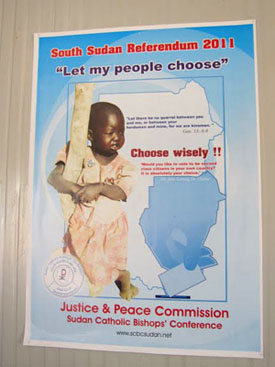
JUBA, Southern Sudan — "We’ll work hard to avoid a possible secession." These words from the United Nations Secretary-General Ban Ki-moon, as reported by AFP last weekend on the sidelines of the African Union Summit in Addis Ababa, set off a media firestorm, provoked forceful condemnation from the Government of Southern Sudan, and resulted in some quick attempts at “clarification” by the Secretary-General’s office in New York. (AFP has since removed the story.)
But perhaps the most interesting response of all was a small protest by southern Sudanese citizens in Bor, the capital of Jonglei state—one of the areas most affected by the highly publicized “inter-tribal” violence occurring that has killed more than 2,500 people in southern Sudan in the past year. The Sudan Tribune reported that “a group of southern Sudanese” (the number was not specified but the protestors were described as “mainly youth”) marched to the United Nations Mission in Sudan base just outside the town of Bor to protest the Secretary-General’s statement. They held signs that read “Ban Ki-Moon is Not God to Determination” and “Our Future Lies on Our Independence.”
There is a poster that I have seen prominently displayed in the offices of many Sudanese people employed in various lines of work in Juba. It was printed by the Sudan Catholic Bishops’ Conference and it features a picture of young southern Sudanese girl, on a map of Sudan, with the words: “Let My People Choose.”
Every southern Sudanese person I have met in my time thus far in Juba is aware of his or her right to vote in the South’s self-determination referendum in January 2011. Implicit in this awareness is the feeling that it is their right alone to determine the future of southern Sudan; this is what their people fought and sacrificed for in two bloody civil wars. I can understand how the Secretary-General’s statements were viewed as an affront to this right, which is also at the center of the Comprehensive Peace Agreement—the agreement that the United Nations Mission in Sudan is charged with supporting.
Although the spokesperson for the Secretary-General has recently made clear that Ban Ki-moon’s widely discussed remarks were inaccurately recorded, the response in southern Sudan to these comments helps to highlight the widespread sentiments in southern Sudan about the right of the southern Sudanese people—and them alone—to decide their future.

